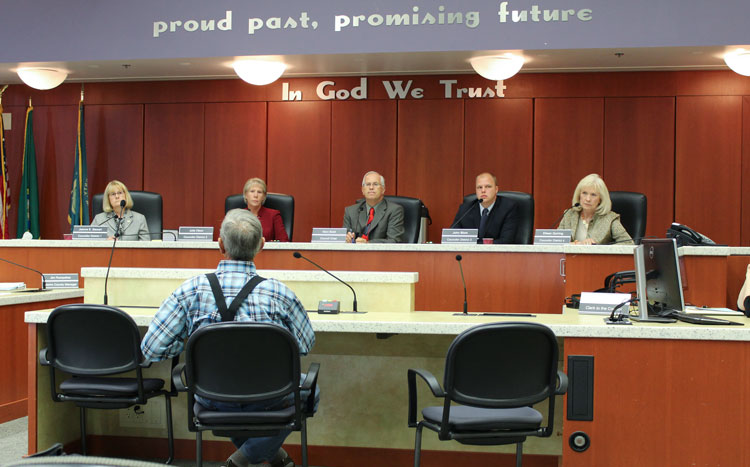
Alex Peru
ClarkCountyToday.com
VANCOUVER — A resolution to revise the Clark County Board of Councilors’ invocation policy was postponed Tuesday, amid concerns that the public had not been given adequate notice of the hearing. The hearing was moved to the next Board of Councilors meeting on Tue., Aug. 22.
In 2013, the Board of County Commissioners approved a resolution that established a moment for an invocation at the opening of public county meetings. The new resolution continues to allow for an invocation at the beginning of meetings, but clarifies and updates the 2013 resolution.

The discussion of the new resolution, which recognizes the “significance of a public hearing through an invocation,” was on the hearing agenda for the Aug. 15 Board of Councilors hearing. However, Councilor Eileen J. Quiring requested that the agenda item be pulled until next week, citing concern from Councilor Jeanne E. Stewart that the public had not been given enough notification of the hearing.
“I certainly don’t want individuals to think that they are being left out, that we’re trying to ram anything down anybody’s throat,” Quiring said.
A motion to approve moving discussion of the invocation resolution to next week’s hearing was approved by all councilors.
While the Board of Councilors postponed the discussion of the invocation resolution, community members had an opportunity to voice their views of the resolution during open public comments.
Former Washougal City Councilor Connie Jo Freeman expressed support for keeping the invocation, and said that such appeals to a higher power help create a sense of unity among citizens.
“In America, we have to look at where we are in our nation, and how we are interacting with one another,” Freeman said. “We have to realize that if we cannot be united, we will fall.”
Freeman asked the council to continue the policy of having the invocation.
“We have rights because we have the Constitution, we have the First Amendment,” Freeman said. “And we all get to stand on that whether we believe in God or we believe in a higher power or we just believe in our own goodness and capacity.”
David Alt voiced similar sentiments to Freeman, and said that he hoped the invocation would remain a part of public meetings.
“The Constitution gives us the freedom of religion, not freedom from religion,” Alt said. “It’s really sad when one or two people can take these freedoms from so many.”
Shannon Lee Roberts expressed concern that potentially removing the invocation would violate the beliefs of many citizens in Clark County.
“Why should one naysayer be able to control what the majority of the county and U.S. citizens believe?” Roberts asked.
Concerns about the state of the nation were also raised in conjunction with the invocation resolution at the hearing. David Richard expressed frustration with the hate he observed in the country.
“God loves all the children — black, yellow, red, white — the song says they are all precious in His sight,” Richard said. “Why can’t we get along?”
Not everyone that provided citizen testimony was in favor of the invocation resolution. James Maynard said that the debate concerning the invocation in county hearings, at public expense, was unnecessary.
“There is no legal requirement for the council to begin its meetings with an invocation,” Maynard said. “It certainly was not the practice before, and it need not be the practice now.”
Maynard said that the invocation creates a “contradiction between theological and legal requirements,” as religious tenets state that God’s name should not be invoked unless it is sincere. However, to do so publicly is only legal because “we don’t really mean it,” and therefore establishes “ceremonial deism.” “I think it’s unwise for the county to promote ceremonial deism,” Maynard said.
The resolution before the board for consideration states that invocations “will preserve, promote and protect the general health, safety and welfare of the County.” It allows any group or organization to offer an invocation before public hearings, regardless of faith. Further, “a group having no religious affiliation” may also request to offer an invocation reflecting on the importance of the meeting, seeking peace for the country, wisdom for leaders or justice for the people.
The new resolution also addresses constitutional concerns, stating that legislative prayer “has long been understood as compatible with the Establishment Clause of the U.S. Constitution.” It also notes that prayer before hearings helps lawmakers to “reflect upon shared ideals and common ends before they embark on the fractious business of governing” serves a legitimate function and thus is constitutional.
The Board of County Councilors will vote on the new invocation resolution at the next hearing on Tue., Aug. 22, 10 a.m., in the sixth floor hearing room of the Public Service Center, 1300 Franklin Street, Vancouver.
The text of the 2013 resolution can be found on the county website at https://www.clark.wa.gov/sites/default/files/dept/files/the-grid/2013_0304.pdf. The full text of the new proposed resolution can also be found online at https://www.clark.wa.gov/sites/default/files/dept/files/the-grid/d081517_AddOn_InvocationResolution.pdf.




